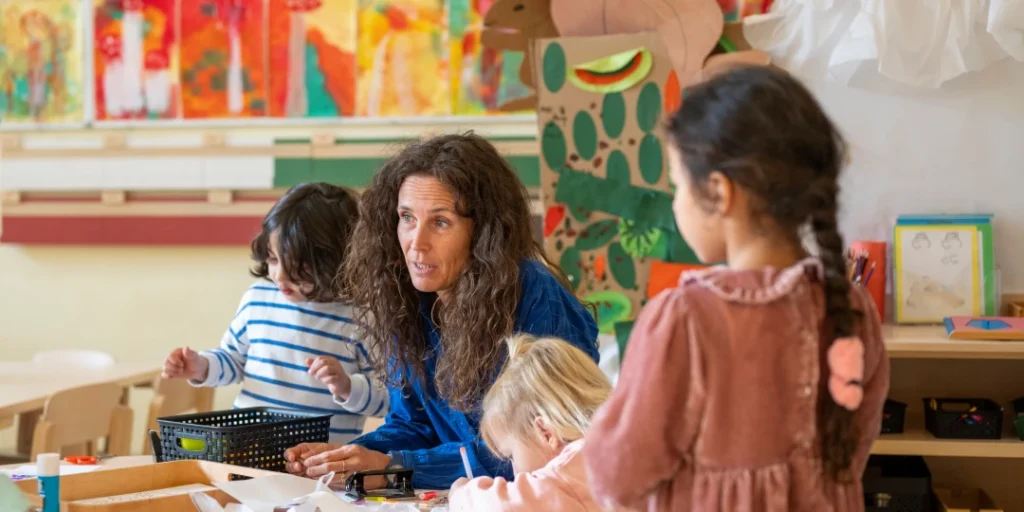![Hermitage Hills Day School Teaches the Hidden Curriculum of Gratitude, Generosity, and Grace. Introduction At Hermitage Hills Day School, education is defined by more than just the basics of reading, writing, and arithmetic. While foundational academic skills remain a vital part of our […]](https://dayschools.org/hermitage/wp-content/uploads/sites/5/2025/05/Day-School-7.webp)
Table of Contents
Introduction
At Hermitage Hills Day School, education is defined by more than just the basics of reading, writing, and arithmetic. While foundational academic skills remain a vital part of our curriculum, they are intentionally balanced with a focus on developing each child’s character, emotional health, and spiritual growth. We believe that early education should nurture the whole child—mind, body, and spirit—so that students are well-prepared not just for kindergarten, but for life.
What truly sets Hermitage Hills Day School apart is our commitment to what educators call the “hidden curriculum.” This concept refers to the unspoken values and social-emotional lessons children absorb every day through their environment and interactions.
Gratitude, generosity, and grace aren’t just ideals at Hermitage Hills Day School—they are everyday practices. Through this intentional approach, children begin to develop a moral compass that shapes how they relate to others and navigate the world around them. Our goal is to build a foundation of goodness and emotional intelligence that will support their academic learning and social relationships for years to come.
What Is the Hidden Curriculum in Early Education?
The hidden curriculum is a powerful element of early education, especially at Hermitage Hills Day School. Unlike traditional lessons that are taught directly—such as counting numbers or identifying shapes—the hidden curriculum includes the subtle yet significant lessons children learn through daily routines, peer interactions, and the overall school culture. These lessons influence a child’s understanding of empathy, cooperation, respect, and responsibility.
At Hermitage Hills Day School, this hidden curriculum is not left to chance. It’s carefully designed and intentionally implemented by educators who understand the importance of modeling strong moral behavior. Whether it’s through the way a teacher comforts a child in distress, how classmates are encouraged to resolve disagreements peacefully, or how students witness acts of kindness and patience, each interaction becomes a teachable moment.
By nurturing these quiet, consistent experiences, Hermitage Hills Day School helps children develop emotional intelligence and social awareness. Students begin to understand that how we treat others is just as important as how much we know. In doing so, the hidden curriculum becomes a foundational part of the learning experience, shaping confident, compassionate children ready to contribute positively to both their classrooms and communities.
Why Character Education Matters in the Preschool Years
At Hermitage Hills Day School, we understand that the preschool years are a pivotal time for shaping a child’s moral character and social behavior. Neuroscience and early childhood research confirm that children form lasting impressions about right and wrong, empathy, and fairness well before they enter elementary school. These early years are an opportunity to plant seeds of kindness, cooperation, and integrity that will grow with them.
That’s why character education is integrated into every aspect of learning at Hermitage Hills Day School. Children are not only taught to recognize letters and count objects but are also guided to practice sharing, listening, forgiving, and caring for others. These values are reinforced daily through intentional conversations, group activities, and positive reinforcement. Character-building is not an occasional focus—it’s embedded into the classroom culture.
By prioritizing character development early, Hermitage Hills Day School helps create children who are not only intellectually curious but emotionally grounded and socially aware. These are the children who can lead with empathy, collaborate respectfully, and navigate the ups and downs of childhood with resilience. In a world that values achievement, we believe raising children with strong character is one of the most important educational outcomes we can offer.

Hermitage Hills Day School’s Philosophy of Intentional Teaching
Intentional teaching lies at the heart of everything we do at Hermitage Hills Day School. Our educators are not just caregivers—they are skilled facilitators of holistic development. Every interaction, lesson, and activity is thoughtfully designed to support a child’s growth across academic, emotional, and spiritual dimensions. This approach ensures that no opportunity to teach values, habits, or life skills is overlooked.
Teachers at Hermitage Hills Day School are trained to recognize the moments when meaningful learning occurs—often during simple, everyday experiences. Whether guiding a collaborative art project or helping resolve a playground dispute, they use consistent, value-based language to model patience, respect, and kindness. These repeated experiences help children internalize positive behaviors that become second nature over time.
What makes Hermitage Hills Day School exceptional is the way we bridge academic instruction with character formation. Our teachers don’t just teach content; they build relationships that foster trust and encourage emotional development. Through this intentional teaching philosophy, we create a learning environment where every child feels safe, seen, and inspired to grow—not only as a student but as a thoughtful, compassionate human being.
Gratitude: Cultivating Thankfulness in Everyday Moments
At Hermitage Hills Day School, gratitude is more than good manners—it’s a daily practice that shapes a child’s outlook on life. From the moment children arrive, they are immersed in an atmosphere where appreciation is both taught and felt. Teachers use age-appropriate methods to help young learners recognize the blessings in their lives, fostering a mindset of thankfulness that becomes part of their emotional vocabulary. Whether it’s through morning prayers, discussions about what they’re thankful for, or moments of quiet reflection, gratitude is made tangible and meaningful.
A variety of classroom activities reinforce this value. During circle time, students participate in gratitude-sharing where they reflect on people or experiences they’re thankful for. Even at a pre-literacy level, children engage in simple journaling through drawings or storytelling. Seasonal projects like gratitude trees or thank-you card stations give students the opportunity to express their appreciation creatively. These small but consistent practices help children at Hermitage Hills Day School form habits of recognizing goodness, which builds emotional resilience and optimism.
Equally important is how gratitude is modeled by staff. At Hermitage Hills Day School, educators are intentional in how they speak and act. They frequently express appreciation toward students, colleagues, and even in response to challenges. This modeling sets a powerful example. When children see adults verbalize thanks and acknowledge small kindnesses, they learn that gratitude is not only a feeling—it’s an action. This environment of mutual appreciation strengthens relationships and helps cultivate a warm, connected school culture.
Generosity: Encouraging a Giving Spirit in Young Hearts
Generosity begins with understanding the joy of giving, and at Hermitage Hills Day School, it’s nurtured from a young age through thoughtful, hands-on experiences. Teachers create opportunities throughout the day where children are encouraged to share toys, take turns, and offer help to classmates. These social interactions form the groundwork for understanding that generosity isn’t about giving things away—it’s about contributing to others’ happiness and success, often without expecting anything in return.
Inside the classroom, structured group activities are designed to promote cooperative play and mutual support. Whether building block towers together or working on art projects as a team, students at Hermitage Hills Day School learn to celebrate each other’s achievements and value shared experiences. Teachers use these moments to highlight the emotional rewards of generosity, praising not only outcomes but the intentions behind giving. Through repetition, generosity becomes a natural part of a child’s behavior rather than a one-time lesson.
Beyond classroom walls, Hermitage Hills Day School extends this value into the broader community. Children participate in age-appropriate service projects such as food drives, creating holiday cards for local nursing homes, or packing care kits for those in need. Parents are invited to participate, helping bridge the gap between school and home and reinforcing that generosity is a family and community affair. These activities teach children that giving is impactful at any age and that their actions, no matter how small, can brighten someone else’s day.

Grace: Teaching Forgiveness, Patience, and Kindness
At Hermitage Hills Day School, grace is more than a spiritual ideal—it’s a daily practice that helps young learners navigate emotions, relationships, and conflict. Children are still learning how to express themselves, manage frustration, and cooperate with peers, which makes the preschool years a critical time to instill habits of grace. Teachers use every opportunity to turn minor disagreements into teachable moments, helping students understand what it means to forgive, show patience, and choose kindness.
When conflicts arise, educators gently guide children through a process of empathetic resolution. Students are encouraged to express their feelings. At Hermitage Hills Day School, these conversations are not hurried or superficial—they are intentional and nurturing, allowing each child to feel heard and respected. This emphasis on emotional intelligence equips students with lifelong skills that extend well beyond the preschool classroom.
Faith is an essential component of how grace is taught at Hermitage Hills Day School. Through simple Bible stories, songs, and devotional time, children learn about grace-filled actions in a way that is accessible and inspiring. Stories like the Good Samaritan or the Prodigal Son come to life through hands-on activities and storytelling that help children relate scriptural values to their everyday choices. In this way, grace becomes more than a word—it becomes a way of living, grounded in love, forgiveness, and a deep respect for others.
Integrating Values into the Daily Routine
At Hermitage Hills Day School, the integration of core values into daily activities is a deliberate part of the learning experience. Our educators understand that young children internalize lessons best when values are naturally woven into everyday moments. This approach makes character education authentic and relatable, helping students develop habits of gratitude, generosity, and grace without feeling like these lessons are separate from their play and learning.
One of the key components of this integration is circle time with a purpose. Each morning, students gather to set the emotional tone for the day by sharing their feelings, celebrating kind acts they’ve witnessed, and listening to brief stories or Bible verses that highlight essential values. These gatherings help children learn to recognize and name their emotions while fostering empathy and respect for their peers. At Hermitage Hills Day School, circle time is a cornerstone of social-emotional learning that supports the hidden curriculum in a gentle, consistent way.
Beyond circle time, routine parts of the school day—such as snack, play, and clean-up—are carefully designed as opportunities to reinforce character development. Snack time encourages sharing and expressing gratitude, as children learn to say “thank you” and offer treats to classmates. Playtime builds generosity and cooperation as students practice taking turns and resolving conflicts. Clean-up time emphasizes teamwork and responsibility, with children helping one another to complete tasks. This holistic approach at Hermitage Hills Day School nurtures a culture of mutual respect and accountability that extends beyond academics.
The Role of Faith in Building Moral Foundations
Faith plays an essential role at Hermitage Hills Day School, serving as the foundation for our character education program. Rooted in Christian principles, our curriculum integrates Bible verses, worship songs, and daily devotions that support both spiritual growth and moral development. This faith-based framework provides children with clear guidance on living out values like gratitude, generosity, and grace in their daily lives.
At Hermitage Hills Day School, faith is not taught as an abstract concept but lived out in meaningful, age-appropriate ways. Teachers use Bible stories such as the Good Samaritan and the Parable of the Lost Sheep to illustrate important lessons about kindness, forgiveness, and caring for others. These narratives are reinforced through activities and discussions that help children connect scripture to their own experiences. This method nurtures a deep understanding of faith’s relevance in building character.
Incorporating faith into daily routines helps students at Hermitage Hills Day School develop a strong moral compass anchored in spiritual truths. Devotional time, prayer, and worship songs foster a sense of community and belonging while encouraging children to reflect on God’s love and grace. By weaving faith into every aspect of education, Hermitage Hills Day School prepares children not only for academic success but also for a life guided by integrity and compassion.

Hermitage Hills Day School Partnership with Parents: Extending Values at Home
At Hermitage Hills Day School, we recognize that character development is most effective when supported both at school and at home. That’s why we prioritize strong partnerships with parents to ensure that the values taught in the classroom are consistently reinforced in family life. Through open communication and collaborative efforts, we help parents become active participants in their children’s moral and spiritual growth.
Our school maintains ongoing dialogue with families via newsletters, parent workshops, and events designed to share insights and strategies for fostering gratitude, generosity, and grace at home. Parents receive regular updates about classroom themes and suggestions for activities that extend learning beyond the school day. This partnership equips families with practical tools to mirror the lessons their children encounter at Hermitage Hills Day School, creating a consistent and supportive environment for character building.
Moreover, Hermitage Hills Day School encourages families to participate in community service projects and faith-based initiatives organized by the school. These shared experiences strengthen the bond between home and school, showing children that generosity and kindness are values lived out in both places. By working together with parents, Hermitage Hills Day School creates a unified approach to raising compassionate, confident children grounded in faith and strong character.
Outcomes We See: Social, Emotional, and Spiritual Growth
At Hermitage Hills Day School, the positive effects of the hidden curriculum are evident every day in how children interact and grow. Our students develop a deep sense of empathy, learning to recognize and respond to the feelings of others with kindness and understanding. This emotional growth helps create a supportive classroom environment where cooperation and respect are the norms, not exceptions.
Teachers at Hermitage Hills Day School frequently observe notable improvements in social skills and behavior. With fewer conflicts and more collaborative play, children demonstrate resilience and problem-solving abilities that set a strong foundation for future learning. The intentional focus on character development means that children not only learn academic skills but also how to navigate social challenges with grace and patience.
Parents regularly share heartwarming stories about their children applying lessons from Hermitage Hills Day School in their homes and communities. Whether it’s expressing gratitude during family meals or offering forgiveness after disagreements, these real-life applications confirm that the hidden curriculum leaves a lasting imprint. Our students emerge from preschool equipped not only for academic success but for a life rich in compassion and community awareness.

Conclusion
Hermitage Hills Day School educating the whole child is central to our mission. We believe that academic excellence must go hand in hand with social, emotional, and spiritual growth. Our dedicated educators create an environment where children develop critical thinking skills while embracing core values like gratitude, generosity, and grace. This holistic approach distinguishes Hermitage Hills Day School as a place where children are prepared not only for school success but for life.
The hidden curriculum at Hermitage Hills Day School weaves character development seamlessly into daily activities, helping young learners internalize important lessons naturally. Through intentional teaching and consistent modeling, children grow into compassionate, respectful individuals equipped with the emotional intelligence to navigate challenges with kindness and resilience. These qualities, fostered early at Hermitage Hills Day School, lay a strong foundation for future academic and personal achievement.
Families who choose Hermitage Hills Day School entrust their children to a nurturing community that values character as highly as curriculum. We partner closely with parents to reinforce these lessons at home, ensuring a consistent, faith-based approach to early education. By prioritizing the whole child—mind, heart, and spirit—Hermitage Hills Day School prepares students to become thoughtful leaders who contribute positively to their communities.Ultimately, Hermitage Hills Day School is more than a preschool; it is a vibrant, values-driven community committed to nurturing children’s growth in every dimension.



